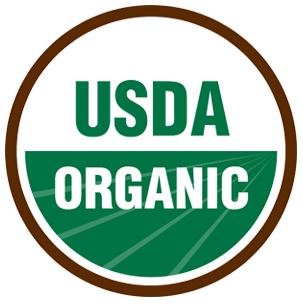The Importance of Organic Certification
Importance of Organic
Organic is so widely used now in marketing that sometimes we can forget about the real importance of choosing organic products. Organic isn't a meaningless marketing term just to make something seem more natural or to hike its price. There are real reasons to use organic products and foods. Organic ingredients are grown without the use of a group of toxic pesticides called organophosphates. Organophosphates kill insects by affecting their nervous systems. Unfortunately it can do the same thing to us, hurting our brains and nervous systems, and they can be used as biological weapons. (Organophosphates have been used as nerve gas in warfare. Source) Herbicides like glyphosate (Roundup) are toxic in moderate to high doses in humans, are a suspected reproductive toxin (xenoestrogen) and are highly dangerous to aquatic life. (Source) Non-organic foods and ingredients contain traces of these poisonous substances. And yes, these are small traces, and the dose does make the poison, but think about daily exposure from your foods and personal care products combined. The exposure can build up. But also, these pesticides and herbicides are sprayed year-after-year on fields, permeating the soil and leaching in to groundwater that affects all those around it, closely, and far downstream. When you buy conventional, you're perpetuating the use of these toxins in the world around us.
Then there are GMOs, Genetically Modified Organisms. These crops have been altered with DNA from a strain of bacteria created to be resistant to glyphosate (so they can spray as much as they want) and to contain toxins that kill insects when they try to eat the crops. These crops can also be harmful to us, possibly leading to infertility, digestive issues and malabsorption of nutrients. (A lot of info on this here.) [Won't get in to the whole Monstanto preying on small farmers and developing countries, but watch Food Inc. and you'll know what we're talking about.] When we choose non-organic, we support GMOs and the companies behind them.
 What it means to you when you see the USDA Organic seal:
What it means to you when you see the USDA Organic seal:
- Ingredients grown and processed with only organic-approved substances, (no organophosphates, etc)
- No artificial colors (colors from juices, etc, only.)
- No artificial flavors
- No GMOs
- No contact with sewage sludge
- No contact with ionizing radiation
- Non-agricultural ingredients in a product must be on the approved substances list (like baking soda and salt) and have to be GMO free and not processed with sewage sludge or ionizing radiation.
- Ingredients on ingredient list are exactly what's in the product and verified by a third party. (Otherwise you're trusting the company to tell you the ingredients. Without certification you end up with ingredients lists with things like "natural cream base" or shampoos that don't disclose the exact detergent they're using.)
